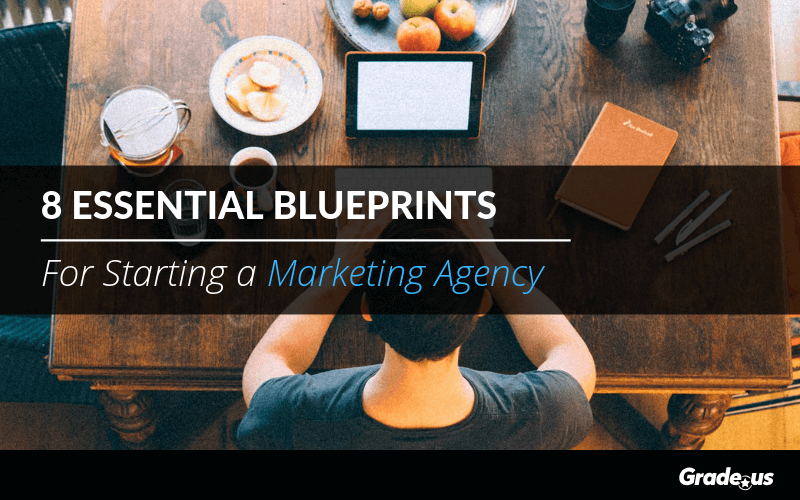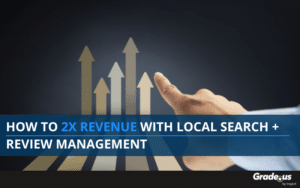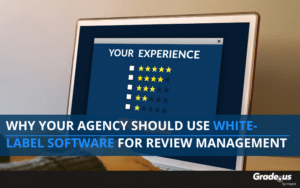What are the ingredients, recipes, must-haves when it comes to starting a marketing agency? Many of our readers here at Grade.us are already the owners and founders of marketing agencies.
But...
We frequently get questions from independent consultants who dream of expanding. We have aspirational entrepreneurs who understand the growing value of local marketing. There are employees of existing agencies who are ready to branch out on their own.
It ultimately begs the question: what does it actually take to start a marketing agency?
Fortunately, the professionals working in our industry are a generous lot. Quite a few founders, who have been pursuing that agency life for a while, were more than willing to share what it took for them to launch their marketing agencies. What shook out was some good, actionable advice that you can use to turn your dream into a reality.
Marketing Agency Blueprint #1: A business plan
You don't need a massive plan filled with charts and graphs unless you're trying to impress an investor, or a bank. Most marketers aren't.
You do need a guiding document. The act of putting together this document helps you to understand whether you've created a viable agency concept yet.
It can also help you make decisions. Competing opportunities and expenses will come along. If you have a plan, it's easy to decide which to invest in and which to take a hard pass on.
What goes in the business plan?
You can download a template, but you don't have to. Most business plans are unique, and there's no right or wrong way to do it. There's only the information the plan needs to contain.
Your plan should include the following:
How much money do you have, and how much do you need?
How many people will need to be on your team at first, and what will each team member do?
What does your overhead look like (and are there ways to reduce it)?
Who are your target customers?
Everyone in the beverage industry? Everyone in the city of Dallas, TX?
How many clients do you think you'll sign during the first year of your business, and how much revenue would that bring in?
Who are your key competitors, and what are they doing? If they list their clients, which clients are they serving?
What makes your company different?
Which services will you provide? Hint: it's usually unwise to try to offer every digital marketing service available, at least at first.
What is your pricing model for those services?
A series of steps you'll be taking to scale and grow your agency.
What social proof you already have, or what steps you'll take, such as pro bono work, to get some.
Revisit your business plan at the end of your first year. You might need to make some adjustments, but you'll be doing so with a much better idea of what your company numbers look like.
Marketing Agency Blueprint #2: An understanding of unit economics
I'd never heard of unit economics until I heard from Marcel Petitpas of Parakeeto, Inc. Like Grade.us, Parakeeto is a SaaS provider, only their thing is offering a dashboard to help agencies keep track of their internal metrics so they can make better decisions.
Petitpas told me there are three core metrics which determine how profitable an agency is.
They are capacity, utilization, and average billable rate.
Capacity determines how much work your agency can achieve in every given year. Each person you add should increase your capacity. Utilization is a measurement of how much of your capacity goes to paid work, versus things like administrative task work. Average Billable Rate is the amount your team earns for every hour you work.
Petitpas provided some key benchmarks.
"Utilization should be at least 60%, but aim for 70%. Your Average Billable Rate needs to be 2.5 times or more of your hourly production labor cost. And your production labor cost should not exceed 65% of your adjusted gross revenue."
He also noted production labor costs shouldn't exceed 65% of adjusted gross revenue, and that your net profit margin should be between 15% to 30%.
It's difficult to generate these numbers before you've started work, unless you've been a solo consultant for some time. But you should at least be aware of them, and you should try to get a sense of them as early as possible so you can monitor them.
If you want to dig into these numbers a bit more deeply, you can do so here.
Marketing Agency Blueprint #3: Owning a niche
We're working in a highly saturated market. Anyone can put their shingle out, and almost anyone does, including people who have never even done digital marketing before.
Thus, having some sort of niche or plan of attack is vital. You can do this one of two ways. You can do it by industry, or you can do it by locale.
Locale can be a strong strategy, says Jason Parks, President of The Media Captain.
"We've been able to grow one of the largest digital shops in Ohio based on the fact that we rank well on Google in Columbus and Cleveland, our two markets."
Parks says many agency owners completely overlook their own local SEO, which means missing quality leads, as well as a realistic chance of ranking on Google at all.
"They're trying to get clients from all over, rather than focusing on businesses in their own backyard."
You can also niche down to a particular industry, one where you have experience or an interest. If you're pitching to a beverage company, being the digital marketing firm that exclusively serves the beverage industry makes you a stronger candidate for the contract. Your industry expertise and experience will separate you from a competing, generalist marketing firm that serves anyone.
Marketing Agency Blueprint #4: A solid (and well thought out) service offering
Usually, you're going to start with what you're good at, and/or what you and your teammates are good at. Keep in mind you don't have to offer every digital marketing service under the sun. There are agencies that only focus on social media and content, agencies that only focus on SEO, and agencies that only focus on branding and PR.
As you grow, you can add more services, if your dream really is to run a one-stop shop. You can hire experts who are incredible at the services you've hired them to provide.
In the meantime, you don't want to dilute your agency's reputation or work quality by selecting services you aren't sure you can deliver on.
See also: Agency Perspective: How to Choose Your Agency's Service Offerings.
Marketing Agency Blueprint #5: A way to generate leads and clients
"The irony is, a lot of digital marketing agencies don't take their own medicine," says Sean Dudayev, of Frootful Marketing. "Many marketing agencies tend to focus so much on the clients, most of which they get through referrals, that they don't have the time or resources to implement the very tactics they are selling to their customers."
Even if you're bursting with referrals, your strong lead generation strategy gives potential clients an idea of what they can expect to receive from you. We've all seen the social media marketing agencies that don't have a social media presence, or the web designers who have terrible websites.
In some cases, this is a sign of an agency that's been founded by people who aren't skilled in the services they plan to sell. In others, this is the sign of an agency that's absolutely overwhelmed with happy clients and who hasn't carved out any time to work on their own stuff. Sadly, most people believe the problem is the former, not the latter.
Plus, even referrals dry up, and client churn happens despite anyone's best efforts. You don't want to be left staring at a silent phone. You need to make sure you have a steady stream of new leads coming in at all times.
Marketing Agency Blueprint #6: A strong sales strategy
Marketing and sales share a symbiotic relationship, but marketers don't always think to address the sales side of the equation.
To start, you need to know who you're going to talk to and how you're going to launch the conversation.
Are you only going to pursue warm leads brought to you by your inbound marketing efforts? Or will you reach out to likely prospects you find on LinkedIn or other services? Will you make a cold call? Send them an email? Will you send them a resource first, and then invite them to contact you?
What will you do once you have a client ready to commit to a longer conversation?
"You need a plan for how you're going to talk to prospects," warns Stewart Dunlop, Founder and CEO of LinkBuilder.io.
"One good place to start is by asking about their major competitors. Who are they, and why are they so successful? Then you can discuss how you are going to elevate their brand and outmaneuver their competition."
Sales is never about making a pitch or pushing people into doing something.
"Talk in terms of their business, rather than your own personal skills," Dunlop adds.
From my background in sales I'd add one more thing: develop an outline for the conversation.
You don't want to bore them with a presentation, but you do want to keep the conversation flowing in productive directions, identifying the client's pain points and demonstrating how you can solve them.
And don't forget: at some point, you're going to have to take a deep breath and ask for the sale. You don't have to do this in an obnoxious way, or in a way that sounds desperate. You can say, "If all this sounds good to you, then let's start the paperwork so we can get your services onto our project management calendar."
As with written copy, the call to action is vital because it helps to switch the client's gears, getting them into a mindset that prompts them to take action. Without this, their brains will remain in passive conversation mode until they have to move on to the next part of their busy day, and they'll never get around to making a decision.
Marketing Agency Blueprint #7: A solid start-up team (or at least reliable freelancers)
Without a team, you're launching a solo consultancy. If you don't have the right team, you could be dead in the water before you even begin.
"We launched as a team of three," notes Alistair Dodds of Ever Increasing Circles. "All of our skills and experience were broadly equally matched, so we were able to cover the key skill sets in-house during launch. We were then able to outsource to trusted freelancers as we scaled before hiring people full time as revenues allowed."
Don't go too crazy.
"It's imperative for founders to determine the absolute minimum number of people you need to produce the A-list service you want to be known for," notes Ikechukwu Maduka, CEO of Nelson Reids. "Typically, that's one digital expert, one content guru, and one graphic expert. You can outsource other critical functions. Even the biggest agencies do."
Between you and your team members, you should have plenty of expertise to go around. "You must have 100% confidence you have all the knowledge necessary to help someone's business grow," warns Dudayev. It's hard to believe that people would start an agency without any knowledge or experience with the services they plan to offer, but it happens all the time.
Marketing Agency Blueprint #8: Time (or at least the ability to make the most of it)
"Forget about 8 hours a day. If you're going to start an agency, you should plan on spending at least 7 days a week." This from Robbert Barrows, founder of R.M. Barrows, Inc., an advertising and public relations firm in San Mateo.
It seems a little hardcore, but it's also realistic: until you have a team and a process that works like a well-oiled machine, you, the founder, are going to have to fill in all the gaps. That can be a grueling process. Even if you're already a solo consultant used to wearing all the hats, you may not be used to managing a team, or networking enough to get enough clients to support the team.
Keep in mind a founder has to spend as much time working "on" the agency as "in" the agency. Some of that time will go towards developing processes and procedures, on strategic decision-making, and on other items capable of turning your business into something capable of running itself even when you finally get a chance to go on vacation for a change.
What it doesn't take: Lots of money
Almost all the founders I spoke to got their start for less than $1000. Some had as much as $10,000. Some of the more conservative ones preferred to have enough money on hand to go six months or a year without any inbound revenue, but this prudence didn't appear to be strictly necessary.
So if you've been waiting to gather a lot of money, don't sweat it, you don't have to.
Work on the 8 items above, instead.
Start your marketing agency
Agencies go in and out of business all the time, and starting one is daunting.
Once you've checked all these boxes, though, all that's left is the execution: consistently doing a fantastic job for your clients, generating new leads for your agency, and closing sales. (Obviously, handling all the fiddly bits like taxes, insurance, and legal matters is smart, too).
Are you thinking of starting an agency? Are you a current founder who has some additional advice? Let us know in the comments below!
About the Author
Raney C. Hudson
Raney C. Hudson is an independent content consultant with a 10+ year track record in the digital marketing industry.









